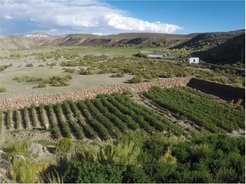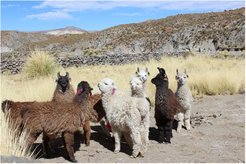Ancient agro-ecosystems as cultural heritage : Past and present solutions to climate change in arid and semi-arid environments

This project currently supported by the Alexander von Humboldt foundation is led by Dr. Verónica Zuccarelli Freire (MPI-GEA) in collaboration with the research group ‘Proyecto Pallqa’ directed by Dr. José María Vaquer (Institute of Archaeology, University of Buenos Aires), the Institute of Regional Social Studies (IRES-CONICET/UNCA) and the ISOtropic group at the MPI-GEA. The extensive history of landscape modification in the Andes underscores the value of ancestral knowledge in managing fragile environments. Moreover, as the world's ecosystems grapple with increasing aridification, it is imperative to understand land management in the context of food security crises and other pressing challenges. Our approach encompasses a multidisciplinary toolkit, which includes archaeobotanical analysis, isotope studies and biomarkers in soils, ethnography and spatial modeling of sites, as well as scientific outreach towards local communities’ demands and policy-making endeavors.

The research has the potential to not only enrich understandings of human adaptations to challenging environments, but also to yield relevant insights into present-day cropping and herding strategies and their long-term legacies for the region and elsewhere. The study region is located in arid High Andean plateau of NW Argentina where an extensive agricultural system was developed between 3800-4300 meters above the sea level since ca. 1200 years CE. Here we work collaboratively with communities where Indigenous water and soil management techniques—such as terrace farming and llama herding—are carried out to manage fragile resources under severe conditions. We argue that embracing plural knowledge systems can be a powerful tool in creating inclusive futures and a more comprehensive approach to biodiversity loss and climate justice. In this context, we aim to explore how Indigenous perspectives can inform interpretations of both present and ancient agroecosystem management practices, connecting these with broader issues of water and the climate crisis.













